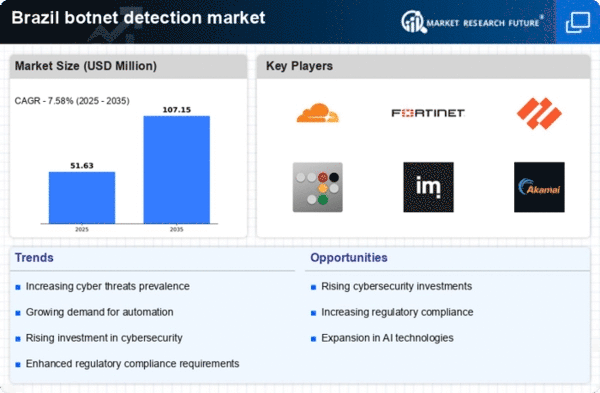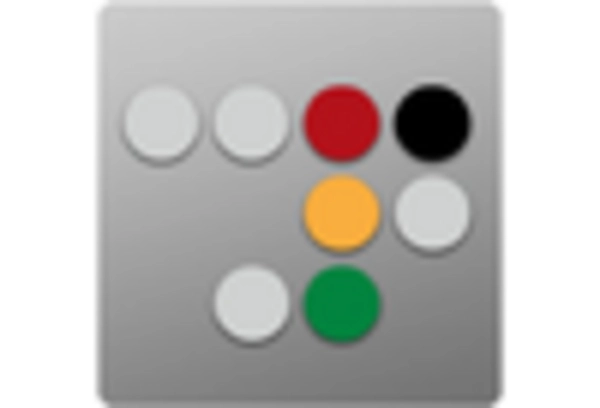Rising Cyber Threats
The botnet detection market is experiencing growth due to the increasing frequency and sophistication of cyber threats in Brazil. Cybercriminals are leveraging botnets to execute Distributed Denial of Service (DDoS) attacks, which have surged by approximately 30% in recent years. This alarming trend compels organizations to invest in robust botnet detection solutions to safeguard their digital assets. The Brazilian government has recognized the urgency of this issue, leading to initiatives aimed at enhancing cybersecurity measures across various sectors. As a result, the demand for advanced botnet detection technologies is likely to rise, driving market expansion. Companies are increasingly prioritizing cybersecurity budgets, with an estimated 15% increase in spending on detection solutions expected in the coming year. This heightened focus on security is a key driver for the botnet detection market in Brazil.
Regulatory Pressures and Compliance
The botnet detection market is influenced by the evolving regulatory landscape in Brazil, where compliance with cybersecurity regulations is becoming increasingly stringent. The Brazilian General Data Protection Law (LGPD) mandates organizations to implement adequate security measures to protect personal data, which includes the detection of botnet activities. Non-compliance can result in hefty fines, prompting businesses to prioritize investments in botnet detection solutions. As organizations strive to meet these regulatory requirements, the demand for effective detection technologies is expected to rise. Additionally, regulatory bodies are actively promoting best practices in cybersecurity, further driving the need for advanced detection capabilities. This regulatory pressure is likely to create a favorable environment for the botnet detection market, as companies seek to align their security strategies with compliance mandates.
Growing Awareness of Cybersecurity Risks
There is a notable increase in awareness regarding cybersecurity risks among Brazilian businesses and consumers. This heightened consciousness is largely attributed to high-profile data breaches and cyber incidents that have made headlines. As organizations recognize the potential financial and reputational damage caused by botnet attacks, they are more inclined to invest in botnet detection market solutions. Surveys indicate that approximately 70% of Brazilian companies now consider cybersecurity a top priority, reflecting a shift in mindset. This growing awareness is fostering a culture of proactive security measures, leading to increased demand for advanced detection technologies. Furthermore, educational initiatives and government campaigns are contributing to this trend, emphasizing the importance of safeguarding digital infrastructure. Consequently, the botnet detection market is poised for growth as organizations seek to mitigate risks associated with cyber threats.
Increased Digital Transformation Initiatives
The ongoing digital transformation initiatives across various sectors in Brazil are driving the demand for botnet detection market solutions. As organizations migrate to cloud-based services and adopt digital technologies, they become more vulnerable to cyber threats, including botnet attacks. This shift towards digitalization is prompting businesses to reassess their cybersecurity strategies and invest in robust detection solutions. Reports indicate that approximately 60% of Brazilian companies are currently undergoing digital transformation, which necessitates enhanced security measures. The urgency to protect digital assets and maintain customer trust is likely to propel the growth of the botnet detection market. Furthermore, as more businesses embrace remote work and digital collaboration tools, the attack surface expands, increasing the need for effective detection technologies. This trend underscores the importance of investing in botnet detection solutions to safeguard against potential cyber threats.
Technological Advancements in Detection Solutions
The botnet detection market is benefiting from rapid technological advancements that enhance the effectiveness of detection solutions. Innovations in artificial intelligence (AI) and machine learning (ML) are enabling more sophisticated detection algorithms, allowing for real-time identification of botnet activities. Brazilian companies are increasingly adopting these advanced technologies to improve their cybersecurity posture. The integration of AI and ML into detection solutions is expected to reduce false positives and enhance the accuracy of threat detection. As a result, organizations are likely to experience improved operational efficiency and reduced response times to cyber threats. The market for these advanced detection solutions is projected to grow significantly, with an estimated CAGR of 20% over the next five years. This technological evolution is a crucial driver for the botnet detection market, as businesses seek to leverage cutting-edge solutions to combat evolving cyber threats.
















